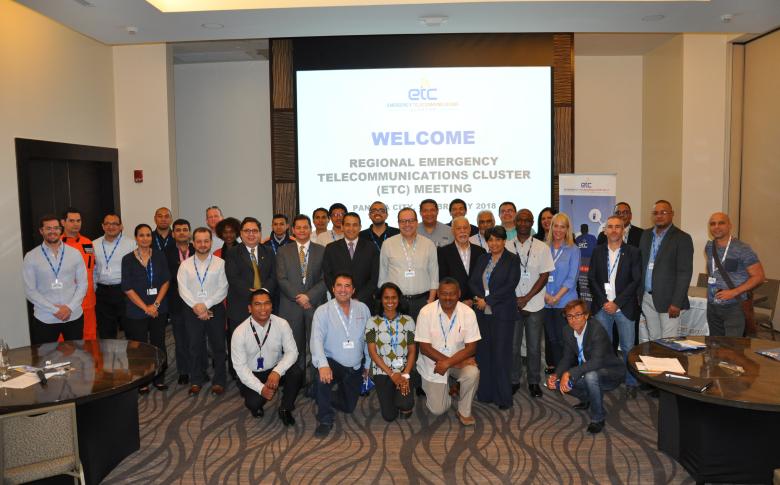Regional ETC Meeting in Panama

2017 was a devastating year for natural disasters in Central and South America, with hundreds of lives lost. Peru was the first to be hit at the beginning of the year with heavy floods, during which over a 150 people died. In April 2017, massive landslides in southern Colombia killed more than 300 people. The Caribbean saw one of its most active hurricane seasons on record, with a total of 17 storms. In September 2017, two powerful hurricanes – Irma and Maria – ripped through the Caribbean islands, claiming more than 200 lives. In the same month, a 7.1-magnitude earthquake hit central Mexico, with more than 300 lives lost.
The events of 2017 highlight that emergency preparedness in the region is more important than ever. The Emergency Telecommunications Cluster (ETC) held a Regional ETC Meeting in Panama this week under the umbrella of the Action on Disaster Relief conference to discuss emergency communications initiatives in the Latin America and Caribbean region and build relationships between emergency responders before disaster strikes.
The Regional ETC meeting held on Monday, 5 February 2018, gathered 34 Information and Communications Technology (ICT) and disaster management specialists – 14 from the humanitarian sector (UN agencies and Non-Government Organisations), 11 from government entities and 9 from the private sector. Additionally, two regional disaster management coordination entities – the Caribbean Disaster Emergency Management Agency (CDEMA) and the Coordination Centre for the Prevention of Natural Disasters in Central America (CEPREDENAC) – representing 24 countries in total[1] - were present.
The ETC meeting encouraged dialogue and information exchanges between participants as well as enabled networking opportunities. “Events like this ETC meeting provide an ideal platform to share best practices, experiences, and build partnerships towards strengthening emergency preparedness and response mechanisms in Dominican Republic,” said Julian Garcia, Assistant Director & Head of the Communications Division, Emergency Operations Centre (COE), Dominican Republic.
Recurring themes included emergency communications and logistics as well as coordination and preparedness between government agencies, especially disaster management agencies, and ETC partners. “Communications and logistics were found to be the two key aspects during the 2017 hurricane season in the Caribbean. It is exciting to see the advancement in these technologies and I am keen to learn how we can make these available prior to disaster, but also how to ensure the devices in place are sustainable in our region,” said Andria Grosvenor, CDEMA’s Planning & Business Development Manager, who participated in the ETC meeting.
Increasingly, the private sector are getting more involved in emergency preparedness and response activities, including improved alignment with the wider humanitarian sector. (Note: This week, the ETC was also participating in the Humanitarian Networking and Partnership Week in Geneva, discussing ETC engagements with the private sector in emergency response). “The exchange of ideas was excellent! I became aware of several ETC initiatives and regional programmes that I had not heard of before.” Sergio Murillo, Director of satellite company - Red52, based in Mexico.
Gabriela Alvarado, WFP Regional IT Officer, emphasized the importance of including private sector organisations in emergency preparedness and the opportunities technology can help leverage during emergency responses, “the ETC meeting created a big opportunity to see how the various entities can better collaborate to improve our response efforts. The unfortunate events faced by the region in recent years have placed additional emphasis on emergency preparedness. With the technology available today and its mobility, we are better equipped to support governments and disaster management agencies in their response mechanisms, while ensuring we provide these tools to the affected population in a disaster. We can achieve this by continuing to collaborate with the private sector.”
The ETC recognises the need to focus on emergency preparedness, which is a core stream of the ET2020 strategy. As an output of this regional ETC meeting, the Global ETC team and wider ETC network of partner organisations will continue to engage with regional and country-level stakeholders to support ongoing work. Perhaps more importantly, the participants left the regional ETC meeting with a renewed conviction that humanitarians, governments and private sector organisations must continue to work together to ensure all those responding to emergencies are better prepared to deal with the natural hazards in the region.
Meeting presentations can be downloaded here.
[1] CEPREDENAC covers: Costa Rica, El Salvador, Guatemala, Honduras, Nicaragua and Panama. CDEMA covers: Anguilla, Antigua and Barbuda, Commonwealth of the Bahamas, Barbados, Belize, Commonwealth of Dominica, Grenada, Republic of Guyana, Haiti, Jamaica, Montserrat, St. Kitts & Nevis, Saint Lucia, St. Vincent & the Grenadines, Suriname, Republic of Trinidad & Tobago, Turks & Caicos Islands and the Virgin Islands.